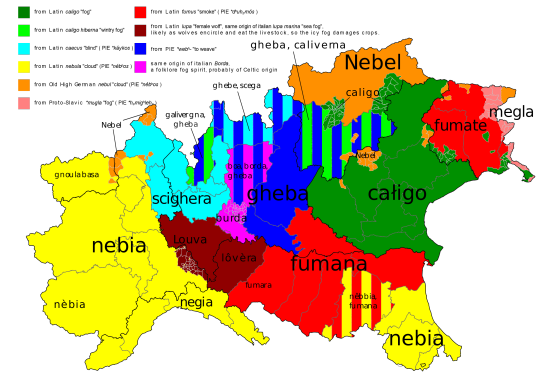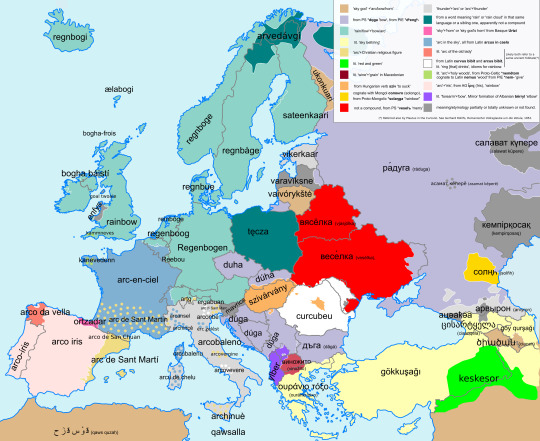#nickanc
Explore tagged Tumblr posts
Photo

Etymology of the words meaning "silver" in European languages.
by u/nickanc
176 notes
·
View notes
Photo

Fog in Northern Italy during the 19th and early 20th centuries.
by u/nickanc
60 notes
·
View notes
Photo

Fog in various Northern Italy regional languages.
by u/nickanc
Map construction and sources for it:
Following the previous request post, in particular this recap. Some sources for words, some include the etymologies used (if not mentioned in the previous links):
Francoprovençal: Gnoula basa ( source Patoisvda )
Occitan: nèbia ( source english wiktionary )
Piemontese: nebia ( source piemonteis.com )
Ligurian: negia ( source 1851 italian-genoese dictionary )
Comasque: galivergna, gheba ( source 1845 vocabulary of dialects of Como's diocese )
Milanese: ghiba, scighera, borda ( source Milanese-Italian dictionary ), particularly scighera more than the others, at least to my knowledge
Pavese: louva, nebia ( source 1874 pavese-italian dictionary )
Lodigiano: burda ( source dialettolodigiano.it )
Cremonese: ghebba ( source 1847 cremonese-italian dictionary )
Cremasque: borda ( source 1852 cremasque-italian dictionary )
Brianzolo : scighera ( source piccolo dizionario brianzolo )
Lecchese : no easily accessible source found, supposed together with Brianzolo as usual.
Sondrio and Valtellina: ghebe, scega ( source dialettando.com )
Bergamasque: boa, borda and gheba ( source 1859 italian-bergamasque dictionary and 1873 dictionary of old and modern bergamasque dialects )
Brescian: gheba ( source Studies over vulgar dialects of italian Tyrol )
Tortonese: no easily accessible source found, supposed together with Piacenza and Pavia as usual.
Piacentino: lôvèra ( source 1855 piacentino-italian dictionary )
Parmesan: fumara ( source 1858 parmesan-italian dictionary )
Reggiano: fumana ( source 1832 reggiano-italian dictionary )
Modenese: fumana ( source 1869 modenese-italian dictionary )
Bolognese: nêbbia, fumana ( source 1851 italian-bolognese dictionary and an online dictionary )
Ferrarese: fumana ( source 1805 portable ferrarese-italian dictionary )
Mirandolese: fumana, caligine (dense fog) ( source 1876 mirandolese-italian dictionary )
Mantuan: fumana ( source 1827 italian-mantuan dictionary )
Romagnol: nebia ( source 1879 romagnan-italian dictionary )
Venetian: całigo ( source elgalepin )
Bisiacco supposed to be together with Venetian as usual.
Ladino: caligo (source italian-ladin dictionary )
Nones : it is a dialect of ladin, no source easily accessible, supposed to have to same words of ladin (likely false).
Trentino: gheba, caliverna (dense fog) ( source 1955 trentino-italian dictionary and Studies over vulgar dialects of italian Tyrol ), probably better sources would provide better understanding of this area, it is likely that it has to be split valley by valley.
Friulano: fumate ( source italian-friulan dictionary )
Slovenian: megla ( source wiktionary )
Resian (slovenian dialect): no easily accessible source found, supposed to be the same of slovenian
Cimbrian: Nebel ( 1763 book on cimbrian people containing the first cimbrian dictionary )
Tyrolean, Carinthian and Walser: I supposed them to be the same of German, I have not found sources confirming or refuting it.
Mòcheno sources not found, supposed to be together with German and Cimbrian.
For those odd etymologies from lupa, there is more in italian or german, among the aforementioned sources. As latin lupa was used by Romans also to indicate someone, often a woman, craving for something, often sex, hence the slang for prostitute, so the icy fog was seen as craving for crops. There is something here talking also about regional languages, otherwise google books offer interesting results for "nebbia lupa".
68 notes
·
View notes
Photo

Meaning of the stems of the words for "rainbow" in the languages of Europe.
by u/nickanc
'Rainbow' is typically a compound word in most European languages. Generally, speaking, a part of the word comes from words meaning bow, belt, ring, circle or arc in their respective languages or ancestor languages. The other one varies and is the main concern of this work.
Some incomplete notes on the meanings and the etymologies I gathered while making the map:
'sky god' + 'arc/bow':
Arabic from Quzah, a pre-islamic deity of weather
Maltese from Maltese alla 'god', from Allah, the islamic deity,
Karelian from Ukko, Finnic sky god
Lithuanian from Vaiva, goddess of Baltic mythology
Armenian is uncertain, supposed to derive ultimately from PIE *dyew- 'shine'
from PS *dǫga "bow". they all are not compounds, except maybe for Russian
'rain/flow'+'bow/arc':
Germanic ones but faroese from PG *regnaburô 'rainbow' obvious compound, *burô comes from PIE *bhewgh-
Faroese æla means shower (as in weather), formerly "flow quickly", from PG *ēlaz "eel"
Finnish from Proto-Finnic *satadak "fall, rain"
Irish and Scot Gaelic are compound words in their very language, there are many other interesting Irish words.
'arc of the old lady' and 'circus bibit', 'arcus bibit'. In some ancient folklore tales, that appear in various IE families, various weather phenomena are especially linked with magical or religious figures that assume the form of old ladies. In Italian and Romanian folklore there are the 'giorni della vecchia'/'zilele babelor' that are the days 29th-31st of March, when the cold is expected to return. In Romania an old lady is Baba Dochia that brings forth the spring and various other Babele populate the Romanian folklore; in the Gallo-italic folklore of Italy there is a folklore fog spirit named Borda that is an old lady personifying the fog, Gaelic mythology has its weather old lady Cailleach, the Indian summer is called in German Altweibersommer lit. 'old women's summer'. The rainbow is no exception: Plautus in the Curculio hints at a folktale of an old lady that drinks "like" the rainbow does or maybe is the rainbow itself, hence also other etymologies for rainbow related to expressions like "circus bibit", "arcus bibit", "arcus imbibens" etc.that give etymologies in various languages. Venetian arcombé and Ladin ergabuan come from arcus imbibiens (source), whereas Romanian curcubeu likely from curvus bibit and Neapolitan arcovevere from arcus bibit. Note that expressions containing the rainbow and the old lady or the act of drinking exist in many languages in this map and their dialects, just they are not the common word for rainbow. For example, in Moldovan there is brîul babei that means 'rainbow' (source), Slovenia has the dialectal word pijâvka 'rainbow' from PS *piti 'to drink', while in Spain and Portugal dialectal expressions that are cognates of the Galician one are apparently common, in Czech there is an idiom pije jak duha that means 'drink like a rainbow', i.e. being a drunkard. Ultimately all what I found points to a 1952 article of Gerhard Rohlfs, Romanischer Volksglaube um die Vetula, which however I was not able to find. EDIT: The Hungarian word is linked to the image of drinking the rainbow too, see below.
'thunder'+'arc' or 'arc'+'thunder':
Estonian is apparently cognate with Livonian pit'kiz kor(?) 'rainbow', lit. 'thunder bow', according to this source, though this comment offers more insight on the origin of the word.
Italian arcobaleno where baleno means flash, thunder, apparently from balena, 'whale', due to a popular habit to make many phenomena zoomorphic or anthropomorphic (the map I posted for fog in northern Italy presents a similar case with she-wolves). Alternatively, there is an article supposedly connecting the words of the 4. with arcobaleno: they suggest that, at some stages of the languages and the sociocultural development, the old lady was an old lady of the sea, thus a whale and their witness would be Galician vella 'old lady' which - according to that article - is a word that could mean also whale. The article is aimed ultimately to strengthen the Paleolithic Continuity Theory, so probably there is little to no scientific consensus on it, though at least I hope their examples are not as disputed as their conclusions.
color: teal. from word meaning "rain":
Polish from(?) OCS тѫча 'rain' and cognate with Russian ту́ча 'rain cloud'
Northern Sami related with Northern Sami arvedálki 'rainy weather'
Basque: 'horn of the sky' or 'sky god's horn', from Basque Urtzi
'arc'+figure of Christian religious figure (Saint John, Saint Martin, Saint Mark, Noah, the Virgin). The choice of the figure seems related to the days of these saints (St. Martin is during the Indian summer, related to 4.), though I have not that much experience on the topic to ascertain that. Noah is clearly linked with rain.
color: green. literally 'arc'+'holy woods', from Proto-Celtic *nemētom, cognate to Latin nemus 'wood' from PIE *nem- 'give, take' source, apparently suggesting a sacred role for the rainbow in Celtic traditions.
Curiosity, not sure if or how it is related to 9. and the other words conveying a sacred meaning for rainbow: in southern Italy, the rainbow was superstitiously considered the cause of jaundice, as màlë du uàrchë is jaundice (source]
274 notes
·
View notes